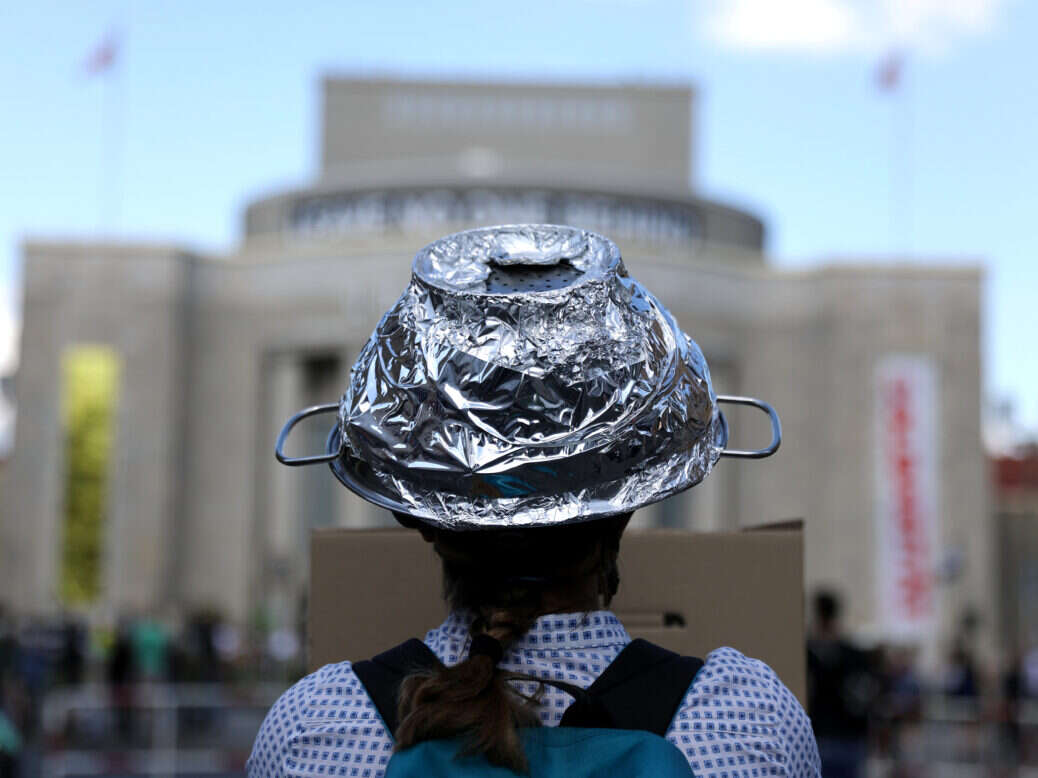
The coronavirus pandemic brought with it not only a global health crisis but a wave of misinformation about the virus’s origins and the vaccine rollout, which included wild conspiracy theories that 5G phone masts caused Covid-19 and vaccines contained microchips.
It’s easy to laugh these claims off as nonsense, but for journalists they present a dilemma: should they be ignored or challenged head-on, risking more people being exposed to them?
The Infodemic, as Press Gazette has identified it, has had real-world consequences. There were reports of people attacking 5G phone masts in the UK during the outbreak last year and vaccine hesitancy caused by conspiracy theories is a matter of life and death for some.
“Conspiracy theories flourish amid uncertainty,” according to Mevan Babakar, COO and deputy CEO at the UK’s independent fact-checking charity Full Fact, which has previously worked with Facebook.
But while they’ve come to prominence during the pandemic, conspiracy theories are of course nothing new.
“Studies have shown that people are likely to turn to conspiracy theories when they experience a state of anxiety and powerlessness. What we saw last year wasn’t necessarily a surge in new theories. We fact-checked vaccine misinformation and health fears about 5G long before Covid-19 – these theories grew and evolved in response to people’s worries last year.”
Babakar said covering conspiracy theories “comes with risks and has to be handled proportionately”, adding: “There’s a balance to be struck between challenging harmful claims and unnecessarily fanning the flames,.
“There’s also a difference between committed conspiracy theorists and individuals with genuine questions or concerns, as we’ve seen recently with the Covid vaccines. The media has an important part to play in filling information gaps, and signposting reliable sources.”
Bob Ward, policy and communications director at the Grantham Research Institute on Climate Change at LSE, proposes a multi-faceted approach for the media in tackling conspiracy theories.
This includes:
- Publishing factually accurate information that disputes misinformation already out there, including the use of fact-checking articles
- Using relatable people in debunking coverage, such as those who previously believed in a conspiracy theory but changed their minds after being exposed to further information
- And challenging prominent and committed conspiracy theorists head-on.
He said that it was important to provide a way for people to safely back down from a conspiracy and change their minds, and this is best done by avoiding making fun of those caught up in it.
[Read more: Cash for conspiracies – How David Icke, ‘alternative’ media and tech giants make money from coronavirus conspiracies]
Social media is ‘making it worse’
Social media is responsible for much of the spread of conspiracy theories, where they can go unchallenged.
Ward said: “It’s undoubtedly getting worse because of social media. Conspiracy theories used to be a niche group that communicated in underground magazines, but since the internet has arrived and social media… they make it much easier for conspiracy theories to spread.
“I think the proportion of people who are naturally drawn to conspiracy theories probably hasn’t changed, but those who are exposed to the misinformation they spread has increased.
“That’s why there’s a bigger danger to a larger fringe of people who don’t buy it, but when they hear the misinformation it just plants seeds of doubt in their minds and makes them much less likely to follow sensible advice and be able to recognise what’s rubbish and what’s true.”
But Full Fact said such misinformation isn’t “limited to the fringes of the internet” and it has “fact-checked examples in the national media too”, adding: “Journalists and editors have a responsibility to back up what they say with evidence, and correct themselves when they make a mistake.”
‘We are a branch of the entertainment industry’

Stories on Express.co.uk
Tabloid newspapers in particular, which seek to entertain as well as inform readers, can give coverage to topics at times flirt with conspiracy theories.
Some say there’s no harm in it, provided the stories are balanced. After all, horoscopes have been widely rubbished by science and yet still appear in a number of newspapers and magazines.
[Read more: Is there a future for newspaper astrologers in the era of fake news?]
The Daily Star has just appointed its first extraterrestrial affairs correspondent in Michael Moran, who runs the title’s new Spaced Out section, which the Star describes as being “home to all your favourite mad stories that are quite literally out of this world”.
Before Moran, Star stablemate The Daily Express had a dedicated “online science reporter” whose remit included “UFOs and conspiracy theories”.
Moran told Press Gazette that conspiracy theories generally “come from a place of narcissism… the person concocting it wants to feel special, wants to feel that they know something that you don’t. So, therefore, 99% of them are sheerest flannel.
“I don’t think there’s any case to answer for there being a flat earth or Neil Armstrong not having landed on the moon or anything like that.
“But equally, if somebody comes up with a new and novel idea like, for example, if someone says the US military have got bits of a crashed UFO and they’re doing stuff with it.
“Now that’s unlikely, but it’s not impossible, so we have to give it some air and we just report it in a kind of – you take great care not to say that these things are facts because you don’t know whether they’re facts or not.
“There are conspiracy theories that I wouldn’t give the time of day to because they’re frankly not really worth bothering. And there are some that are interesting and thought provoking.”
He added: “Conspiracy theories are mimetic, they’re a virus essentially that operates through the internet. So you don’t want to give them too much air. But by the same token, some of them are deeply funny and I can’t quite resist…
“We are a branch of the entertainment industry. I really have got no time for anti-vaccine conspiracy theories and climate change conspiracy theories because I just don’t personally have time for them
“The balancing act to be done between looking at conspiracy theories and ruling them out, just not giving them the oxygen of publicity or looking at them and thinking, well this is at least something worth discussing even if we don’t necessarily adhere to it…
“I don’t think for one minute that John Kennedy was assassinated by some complex conspiracy but a lot of people do. However, his younger brother almost certainly was in my book, and we don’t talk about that at all.”
Moran said it was important to include balance in any story, and ask “does it pass the smell test, is it interesting? And does it stink?”
[Read more: Infodemic investigation – Facebook is biggest source of false claims about coronavirus]
‘Newspapers are part of the solution’
But not everyone agrees with this light-hearted approach to conspiracy theories and other claims made without credible evidence.
Ward said: “People don’t believe everything they read in the newspapers, but on the other hand if newspapers make it even more difficult to distinguish between fact and fiction, then you shouldn’t be surprised when people buy any kind of nonsense.”
Luckily the answer also lies with the news industry, according to Ward.
“Newspapers are part of the solution, because our biggest danger is the consumption of news where people are able to filter it out on the digital platforms, they filter out anything that isn’t consistent with their point of view. Reading a good old fashioned newspaper is one of the best ways of exposing people to kind of a range of different views and different viewpoints which they wouldn’t necessarily see otherwise.
“So it would be good if newspapers recognised that they need to strongly defend that role as a public interest service. Social media organisations are just driving people much more down a dangerous path of filtering out things they don’t agree with, even if it’s telling them that they’re falling for a ridiculous conspiracy theory.
“Some conspiracy theories don’t have much direct damage, but conspiracy theories during a pandemic and on climate change are demonstrably harmful. They harm people either directly because they expose themselves to this, or it prevents them from taking part properly in democratic processes of voting for policies that ultimately are to their benefit.”
The truth’s out there, and it’s a journalists job to share it with you.
Main picture: Reuters/Christian Mang
Email pged@pressgazette.co.uk to point out mistakes, provide story tips or send in a letter for publication on our "Letters Page" blog
